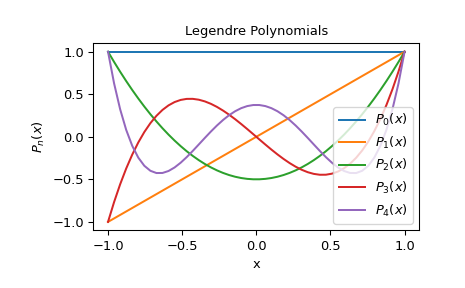scipy.special.eval_legendre¶
-
scipy.special.eval_legendre(n, x, out=None) = <ufunc 'eval_legendre'>¶ Evaluate Legendre polynomial at a point.
The Legendre polynomials can be defined via the Gauss hypergeometric function \({}_2F_1\) as
\[P_n(x) = {}_2F_1(-n, n + 1; 1; (1 - x)/2).\]When \(n\) is an integer the result is a polynomial of degree \(n\). See 22.5.49 in [AS] for details.
- Parameters
- narray_like
Degree of the polynomial. If not an integer, the result is determined via the relation to the Gauss hypergeometric function.
- xarray_like
Points at which to evaluate the Legendre polynomial
- Returns
- Pndarray
Values of the Legendre polynomial
See also
roots_legendreroots and quadrature weights of Legendre polynomials
legendreLegendre polynomial object
hyp2f1Gauss hypergeometric function
numpy.polynomial.legendre.LegendreLegendre series
References
- AS
Milton Abramowitz and Irene A. Stegun, eds. Handbook of Mathematical Functions with Formulas, Graphs, and Mathematical Tables. New York: Dover, 1972.
Examples
>>> from scipy.special import eval_legendre
Evaluate the zero-order Legendre polynomial at x = 0
>>> eval_legendre(0, 0) 1.0
Evaluate the first-order Legendre polynomial between -1 and 1
>>> import numpy as np >>> X = np.linspace(-1, 1, 5) # Domain of Legendre polynomials >>> eval_legendre(1, X) array([-1. , -0.5, 0. , 0.5, 1. ])
Evaluate Legendre polynomials of order 0 through 4 at x = 0
>>> N = range(0, 5) >>> eval_legendre(N, 0) array([ 1. , 0. , -0.5 , 0. , 0.375])
Plot Legendre polynomials of order 0 through 4
>>> X = np.linspace(-1, 1)
>>> import matplotlib.pyplot as plt >>> for n in range(0, 5): ... y = eval_legendre(n, X) ... plt.plot(X, y, label=r'$P_{}(x)$'.format(n))
>>> plt.title("Legendre Polynomials") >>> plt.xlabel("x") >>> plt.ylabel(r'$P_n(x)$') >>> plt.legend(loc='lower right') >>> plt.show()

